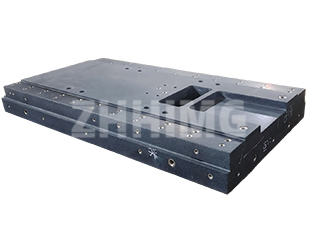Granite precision platforms are crucial components in industries that demand high accuracy and stability, such as metrology, semiconductor manufacturing, and mechanical engineering. One of the key material properties that define the performance of these platforms is the “elastic modulus,” often referred to as the modulus of elasticity. This parameter directly influences the platform’s resistance to deformation under applied forces, ensuring its effectiveness in precision measurements and high-accuracy operations.
The elastic modulus of a material is a measure of its stiffness, quantifying how much it deforms under a given load. Specifically, it describes the relationship between stress (force per unit area) and strain (deformation) within the material when subjected to elastic deformation. A high elastic modulus means the material is stiffer, and its shape changes less under stress. In the case of granite, a naturally stiff and durable material, its high elastic modulus makes it resistant to deformation, even under significant loads.
For granite precision platforms, this property is essential. These platforms are often used in applications requiring extremely tight tolerances and consistent performance over time. The greater the elastic modulus, the less the platform will bend or distort under weight, ensuring that measurements remain accurate even when the platform is in use for extended periods or under varying environmental conditions.
Granite’s inherent stiffness helps it maintain its geometric integrity, which is crucial for applications such as coordinate measuring machines (CMMs) and other precision measuring devices. The material’s stability is critical in ensuring that results are not compromised by unwanted deformations, which could introduce measurement errors or misalignments.
Moreover, the elastic modulus of granite contributes to its ability to absorb and dampen vibrations. This is particularly important in settings where external vibrations could affect the precision of measurements. The combination of low deformation under load and high vibration resistance makes granite an ideal material for precision platforms used in high-accuracy industrial settings.
In conclusion, the elastic modulus of granite precision platforms is a key factor that defines their ability to resist deformation under load. It ensures stability, accuracy, and reliability in critical measurement applications, making granite a material of choice for industries requiring precise, consistent performance. Whether in metrology, engineering, or manufacturing, the high elastic modulus of granite plays a crucial role in maintaining the integrity of precision equipment, contributing to its widespread use in high-performance applications.
This combination of strength and stability is what makes granite precision platforms so valuable in the most demanding industrial environments.
Post time: Oct-20-2025

